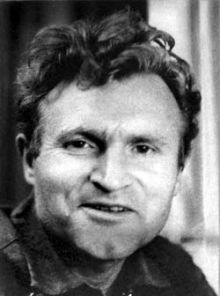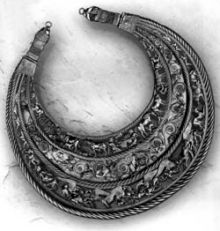Who is Borys Mozolevsky? Unfortunately, few Ukrainians, even those who work in the field of humanities, can answer this question. This ignorance is not merely a disgrace; it should also raise the alarm in this country. Mozolevsky was a prominent scholar, archaeologist, and gifted poet-a man of great destiny and a true Ukrainian patriot. In 1971, during excavations in the Tovsta Mohyla barrow in the Ukrainian steppes not far from the town of Ordzhonikidze in Dnipropetrovsk oblast, Mozolevsky discovered a Scythian pectoral dating to the 4th century B.C. His world-famous discovery is rightly considered the greatest archaeological find of the 20th century in Ukraine. If Mozolevsky had done nothing else (and the list of his archaeological discoveries is astonishing) he would have had every right to expect grateful remembrance from his descendants.
We hope that the second considerably revised and expanded edition of his celebrated work, Skifsky step (The Scythian Steppe) will help restore the name of Borys Mozolevsky (the first edition was published by Naukova Dumka in 1983). The launch of the revised edition, encompassing the efforts of editors, art photographers, book designers, as well as experts from the Institute of Archaelogy of the Ukrainian National Academy of Science, took place recently at Kyiv’s Book and Publishing Museum. In her introductory remarks Yulia Oliynyk, the director of Tempora Publishers, said that the new edition, marking Borys Mozolevsky’s greatest achievement, should spark discussions of the eminent scholar’s destiny and the overall cultural situation in Ukrainian society.
Mozolevsky was a scholar with an international reputation, whose accomplishments would be recognized as a national achievement in any civilized democratic country. In Ukraine’s case, the author of The Scythian Steppe made several futile submissions of his book to a number of publishers. Each time he was turned down because no one wanted to have anything to do with an author who was in the bad books of the “competent organs of the KGB under Brezhnev, with their maniacal accusations of “nationalism,” targeting practically everyone who had a sense of national identity.
Borys Mykolaiovych Mozolevsky was born in the steppes of Mykolayiv oblast, where he acquired an intimate knowledge of the land that revealed its mysteries to him, as to no other. In the intuitive sense he was the “spiritual brother” of the steppes, which “forgave” this unique researcher his intrusions-excavations of ancient burial mounds in the age-old quiet of the steppes. Ms. Oliynyk noted that Mozolevsky perceived the steppes not only as a scholar but as a man of letters. His Ukrainian was excellent and he was able to think in images. To him, the primordial Scythian steppes were above all an ethical concern, not just a source for obtaining historical knowledge. Ages will pass, pains will abate, battles will be fought, but the steppes will remain. But they are still a mystery that must be solved. Did Mozolevsky solve it? He is the only one who could answer this question, but he died 13 years ago; in February 2006 he would have celebrated his 70th birthday.
It is painful to realize that we have lost such a unique personality. Who knows, maybe our descendants will recognize his genius. During his lifetime this distinguished Ukrainian scholar excavated over 100 burial mounds in the steppes of southern Ukraine and researched Scythia’s ethnography and sociopolitical order. Mozolevsky continued to contribute to world archaeology until several months before his death. In 1991, while excavating the Soboleva Mohyla site, he discovered the burial site of a Scythian priest’s family, in which he unearthed a spindle that scholars describe as a “symbol of eternity”. This discovery was Mozolevsky’s swan song.
Guests at the book launch viewed a Russian-made documentary dedicated to the great scholar and thinker. It is shocking to realize that no one has gotten around to making a documentary about Mozolevsky in Ukraine. The soundtrack features a poem by Mozolevsky overdubbing the offscreen narrator: “To kill first and then erect a monument. This is how I recognize my homeland.” This is a soul-searing moment, for Mozolevsky was writing about himself.








